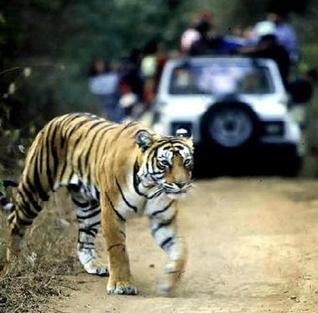People
"Billy" Arjan Singh: Honorary Tiger
by PHIL DAVISON
Born into a dynasty of Sikh Maharajas with plenty of land and forest to hunt in, Kunwar "Billy" Arjan Singh grew up, in his own words, a "bloodthirsty, murderous urchin who shot anything that moved".
Then one day, in his forties, after shooting a young leopard in the headlights of his jeep, he had an epiphany. "I watched the fire fading from its eyes. I was overcome with remorse. I had no right to destroy what I could not create, to kill for personal pleasure."
From that day on, and for more than 50 years, he became one of the world's greatest conservationists, winning government agreement for the Dudhwa National Park in Uttar Pradesh, India, and a sanctuary for his beloved "big cats" - tigers and leopards. He called his home 'Tiger Haven'.
He lived there most of his life, starting off alone in a grass hut, later in a proper house with a small army of servants, an elephant called Bhagwan Piari ("loved by God), a peacock named Tom Dooley, a dog called Eelie, a cat called Tiffany, his pet python Monty and a monkey by the name of Elizabeth Taylor. At various times he was also surrounded by his leopards Prince, Harriet and Juliette and his tigress Tara, born at Twycross zoo in England and later "untamed" by him and sent back into the wild.
A born outsider, cantankerous, crusty and often controversial, he liked to call himself an "honorary tiger". Armed only with a walking stick, he tracked tigers through forest and jungle to follow their progress, trusting - correctly - that they would not attack him unless he threatened them. "With their strong sense of smell, a tiger will run away from a human because our excreta smell so foul," he once said.
To watch Arjan Singh with a tiger was like seeing someone meet an old lover again, according to American author Geoffrey C. Ward who wrote about him in his book Tigers and Tigerwallahs .
A body-builder all his life and with a powerful physique into his old age, Arjan showed short shrift to poachers, fought for a ban on tiger hunting for sport and thereby put dozens of shikar - sport hunting - companies out of business. To him, the tiger was the apex of the food chain, and a healthy big cat population meant a healthy jungle. "We must save the tiger," he liked to say. "It's to the tiger that we owe the air we breathe, the water we drink. If it goes, we go."
British writer and naturalist Duff Hart-Davis, a longtime friend and biographer of Arjan Singh, recalled: "Diplomacy was never his suit: once he hitched an intruder on to the back of his jeep and towed him bodily away; another time, in my company, when he found two men stealing firewood, he flattened them, right and left, with swingeing blows that sent them spinning to the jungle floor."
On another occasion, he set the harmless python Monty on two poachers who quickly made themselves scarce with dancing feet. He let his own pet tigress and leopards roam free around his house, but because his ageing mother was not quite so confident around them, he built her a thatched enclosure in the yard. He called it "Gran's Cage".
Kunwar Arjan Singh was born to a princely family in Gorakhpur, in the eastern part of the Indian state of Uttar Pradesh, on August 15, 1917. His father, Jasbir Singh, who had studied at Balliol College, Oxford, was a grandson of the Maharaja of Kapurthala, a member of the Ahluwalia dynasty from the Punjab.
Young Kunwar was sent to school in the resort of Nainital in the Kumaon foothills of the Himalayas and later studied at Allahabad, one of India's oldest universities. Since his family owned or controlled large areas of land, "Billy", as he became known, spent much of his youth hunting with his older brother Jaswant, who would later become an air vice-marshal. He killed his first big cat, a leopard, when he was 12 and his first tiger two years later. In 1940, he joined the British Indian army, serving in Iraq during the second world war but seeing no combat. He left as a lieutenant in 1946.
Jobless, he rode his elephant to eastern Uttar Pradesh and bought land in the Lakhimpur Kheri district with the original intention of farming and hunting. After his 1960 experience with the dying young leopard, he decided to concentrate on conservation, having his first success by introducing and preserving a herd of barasingha, or swamp deer, that had been considered an endangered species. Describing his new home, he wrote: "The stentorian bugling of the swamp deer, the urgency in the rutting bray of the cheetah, the lilting crow of the jungle cock and the clarion call of the peacock all combine to make up the pulsating rhythm of the great forest."
He in effect appointed himself as a wildlife warden in what had previously been a magnet for hunters and poachers and, after he single-handedly fought off and lobbied against the hunters, persuaded the government to declare the entire area a national park in 1977.
By then, Arjan had brought Tara, described as a Royal Bengal Tigress, from Twycross zoo in Warwickshire, trained her gradually to get used to the wild and to hunt, and then set her free. When his tracking revealed she had produced a litter, he was over the moon. Critics said that Tara was not a pure Bengal tigress but had some genes of white-faced Siberian tigers and threatened the purity of the area's native cats. She was also blamed for a wave of deadly attacks on humans.
Arjan denied both claims. Tara is thought to have survived to a ripe old age with several more litters.
In 2004 Singh was awarded the J. Paul Getty Wildlife Conservation Prize by the World Wide Fund for Nature.
Billy Arjan Singh, who never married, died at Tiger Haven, Jasbirnagar, on New Year's day, 2010, at the age of 92.
[Courtesy: Financial Times]
January 17, 2010






